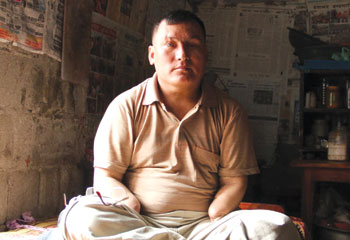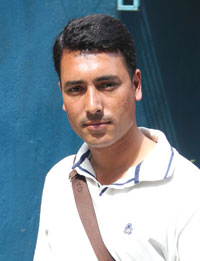Comrades who fought alongside each other have charted out different futures for themselves

PICS: AMIR JOSHI
SAME BUT DIFFERENT: Former Maoist combatant Jaya Bahadur Nyasur from Makwanpur has no regrets about choosing retirement, but feels let down by uncaring leaders and wonders how he will support his family.
Jaya Bahadur Nyasur looked on with indifference last week as ex-Maoist combatants were formally inducted into the national army. The 35-year-old from Makwanpur, who opted for voluntary retirement in 2012 after six years in the UN-supervised camp in Nawalparasi, was engaged in hand-to-hand combat with some of them not too long ago.
Although he has no regrets about choosing retirement, like thousands of his former comrades Nyasur feels let down by uncaring leaders and is beginning to question what it was all for.
“I dedicated my life to the party and the revolution and didn’t ask for anything in return. But look at me now. I have a family of five to look after and I was injured,” he says. “The party doled out millions so the son of our leader could climb Mt Everest, but it couldn’t care less about people like me. I feel used.”
After the regrouping process in January last year, 7,365 former combatants opted for voluntary retirement and only six chose the rehabilitation package. Of the 1,430 who qualified for integration into the Nepal Army 1,352 passed out from eight training centres in Trisuli, Saljhand, Itahari, Kharanitar, Rajhene, Hile, Surkhet, and Boradari on 5 July, marking the end of seven years of the peace process.
Today Nyasur lives with his wife and four daughters in a rundown shack near Bhimsengola in Kathmandu. He lost his hearing, much of his sight, and both his arms during the battle of Hetauda in 2004. The Rs 6,200 he received as compensation government has long run out.
An American journalist offered to take his daughters to the US for schooling but Nyasur turned it down saying his daughters should study in Nepal and contribute to the development of their motherland. It’s a decision he regrets deeply. With his monthly income of Rs 6,800 as a helper, he cannot afford to send his daughters to school.

Saral Paudel from Sindhupalchok who also opted for retirement, has not lost his revolutionary zeal and works in his village indoctrinating students in communist ideology.
“Those who never had to witness the violence and destruction of war have now amassed enormous wealth and are running the country, while those of us who scarified our lives on the front lines for the equality and freedom of fellow Nepalis are being neglected by the state and have nowhere to go. I would like the leaders to step into our shoes for a day,” he says.
Twenty-seven-year-old Nanda Rai from Dhankuta joined the Maoist army when he was 17 and after the conflict chose to be integrated into the Nepal Army. He says he decided to join because he wanted a fresh start and live a life of dignity.
“If I had gone home, people in my village would look down on me, now that I am in the army they will show a little more respect,” he says. Looking back, he feels the war was not only pointless but also robbed thousands of young Nepalis like him of a bright future.
“Selfish leaders took advantage of our desperation and manipulated us into fighting on their behalf,” he says, “they are in power now, but what have they done for the thousands who sacrificed their lives for the revolution?”
Unlike Nyasur and Rai, 35-year-old Saral Paudel from Sindhupalchok has not lost his revolutionary zeal. Paudel was active in village politics from a young age and even though he came from a middle-class family, he was convinced about the need for liberation through armed struggle.
“I do not regret my past, am proud of my achievements, and feel there is better future for the nation. If our party is given 10 years, we can turn Nepal around and make it more prosperous and equitable,” he says.
Believing that all his hard work during the war would go to waste if he joined the Nepal Army, Paudel chose voluntary retirement. Since then he has been working as the district-in-charge for the UCPN (M) in Sindhupalchok where he indoctrinates students and labour union members in communist ideology. He recently published a book named Krantika Kathaharu, a collection of his diary entries from the war (see box).
Poudel is frustrated with the integration process and how party leaders stopped paying attention to the rank and file. “There are certain norms that need to be applied when two major forces of the country are merged. I have continuously expressed my dissatisfaction about the management of ex-combatants, but sadly no one bothers to listen,” admits Paudel.
As the discontent of former combatants festers, there is a danger they may flare up into bigger problems. Yet, the voices of these young foot soldiers are all but drowned out by musical-chair politics.
Says Nyasur, “We need food, we need opportunities, we need development. But both the state and the party have failed to look after common Nepalis. We fought for 10 years and nothing much seems to have changed.”
Read also:
Remember what happened, East West by Kunda Dixit
A war of words
Writing about a revolution
After three attempts to publish his war-time diary as a book, Poudel had given up. But his wife Asmita encouraged him to finally finish it. Krantila Kathaharu (Stories of the Revolution) were published recently by Poudel’s Third Division of the Maoist army.
Poudel had a fellow-warrior and friend during the conflict named Kabita. She once asked him: “What will you write if I die in this war?” He had replied flippantly and asked her what she would write. “I will write a poem for you since my name means poem,” Kabita had replied.
She died in the battle of Rumjatar and Poudel decided that he would start writing a diary which was published as a book in which he remembers fallen comrades, details of various battles, and his strong dissatisfaction with the integration process. He writes about Kabita’s courage in proposing to marry a comrade who was junior to her.
Paudel was seriously injured in the battle of Ramechhap and the book details the years after the conflict when he decided on the retirement package.